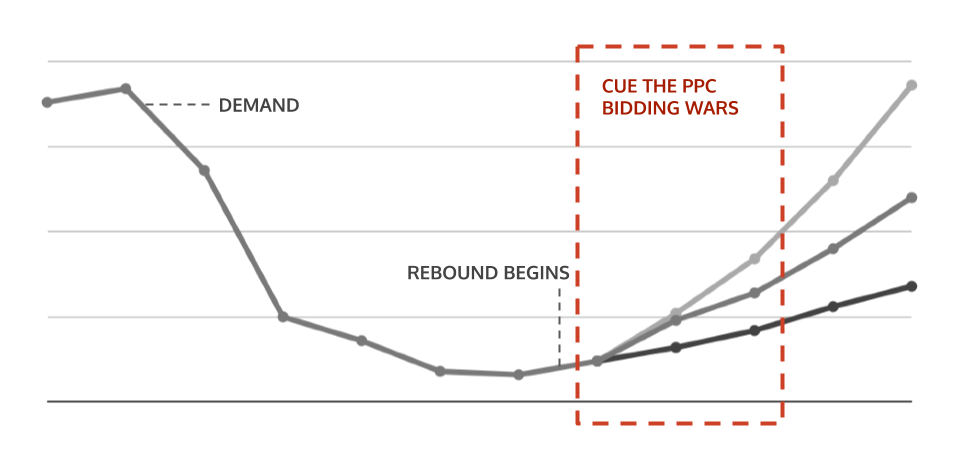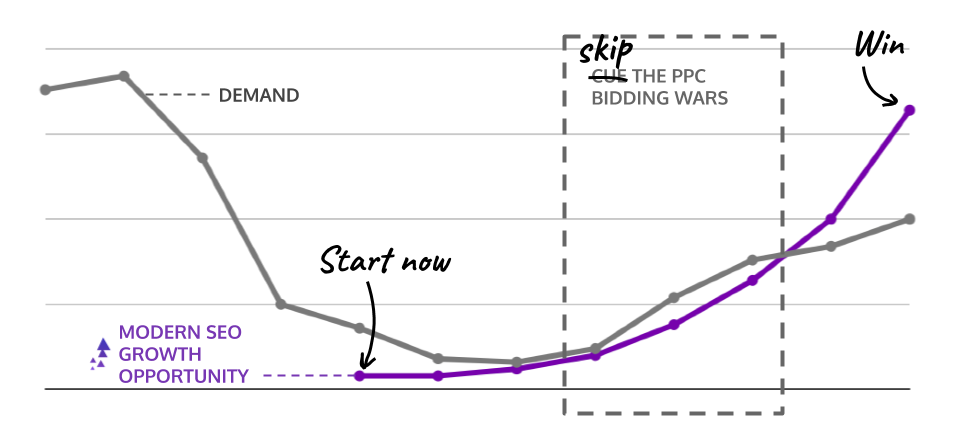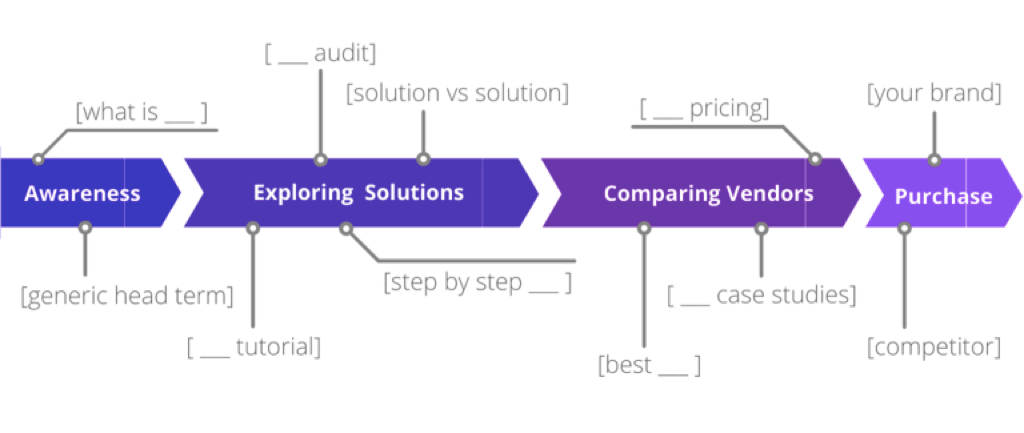PPC & SEO: How to Prepare for Maximum Reach During the COVID Rebound
Marketing directors and managers are facing a myriad of difficult decisions these days. Some budgets are tightening, while others are expanding. Some are even trying to figure out how to make the most of funding that was earmarked for events that have been cancelled.
And all are suddenly facing the urgent pressure to become fortune-tellers as well. Do you invest the marketing spend now, or wait? When is the right time? Which channels are the best options? What can the brand do now to be poised for success when the economy rebounds?

Because while we don’t yet know when that will happen, or what it will look like, no one is talking about if the economy will recover. It will. And a modern SEO growth strategy can put a company in the perfect position to drive significant organic traffic, but you need to start now in order to be ready for the rebound.
What the Rebound Looks Like For Marketers
Current spend is down in many markets. As those markets start to recover, however, demand for your products and services will start to grow again. It may be slow and gradual; it might spike; it might come in peaks and valleys. But it will come.
Those marketers who have not been preparing will lean heavily on the instant gratification of paid ads. PPC marketing is, after all, an easy switch to flip: Start paying and the brand starts appearing on users’ screens.
As more and more brands try to pull that lever, however, the cost of those paid channels will skyrocket.

Note: Demand lines are examples, not an economic forecast.
Thus, as any single brand tries to move into recovery, three difficulties arise:
- Paid channels could become out of reach.
- The ROI for paid leads will likely drop significantly.
- The competition on paid platforms will be more fierce than ever.
How Savvy Marketers Can Use SEO to Get Way Ahead of the Curve
SEO is already the biggest factor in the buying journey.
- Decision makers listed web search as the most influential resource in purchase decisions—above vendor websites and peers/colleagues.
- 45% of searchers click on an organic result, compared to the 4% who click on an ad.
- 68% of those organic clicks go to the first five organic search results.
By the second half of 2020, SEO will command even greater authority, because all of your audience’s digital habits and preferences are becoming more reinforced. Purchase decisions might be on pause, but decision makers and influencers are sheltering at home—increasing their dependence on (and trust in) search engines for everything from news, to future business decisions, to activities that keep kids busy.
That means right now is the perfect time to start building a reliable, modern SEO strategy that will elevate the brand, through organic search, in time for your market to rebound.

The very best SEO content grows consistently, creating a momentum that compounds to exceptional levels. A library of strategic, expertly crafted, and thoroughly researched SEO content creates a flywheel effect that will help carefully place the brand in front of each target persona at each stage of their buyer’s journeys.
Building an SEO strategy and content engine now will free your marketing team from the PPC bidding wars that are coming. Starting now will put the brand in front of buyers at the rebound, without having to rely on paid ad campaigns.
A Lean SEO Strategy for the Modern Market
Marketers on a tightened budget themselves can still start building organic growth momentum. It’s true that SEO requires an up-front investment, but it’s also true that too many marketers are still wasting SEO resources on technical work that won’t create results and SEO content that isn’t competitive.
A modern SEO strategy is a lean SEO strategy, because it’s focused on the fastest path to revenue and the greatest ROI.
There are two keys to finding that path:
1. Make sure the technical foundation is in order.
It is possible, for almost any website, to make a long, exhaustive list of technical fixes, needs, and “errors.” The problem is, updating or “fixing” most of those issues will have no measurable effect on the site’s performance in organic search.
There are five categories of technical tasks that will actually improve the SEO of a site. Five.
Step one to a lean SEO strategy is to audit the site for those five needs, fix anything that is hindering organic search performance, and then move on to SEO growth tactics.
2. Create “best in the world” SEO content.
Getting your content and brand in front of target audiences in organic search today means learning how to write competitive SEO content, and that starts with research.
- Identify keywords and phrases along each stage of the buyer’s journey, for each persona on your target buying teams. What terms are they typing into search engines to find answers?
- Identify user needs for groups of related keywords. What are the real questions and needs behind those keywords? What types of content are they really looking for?
- Study the content that is already winning in organic search for those topics and user needs. What are they doing well? Where could your brand voice stand out to create a unique experience for the user?
- Craft outstanding content that brings together insights from all of the research, modern SEO best practices, and your brand’s distinct value.
It’s a much more intense approach to content than some marketers are used to, but it’s the only way to create reliable SEO growth.

Start Preparing for the Economic Rebound Now
A lot of brands, and individual professionals, are in the midst of a watershed season. This will be the time that we look back on, a decade later, to reflect on which brands pivoted well and which did not—which leaders kept long-term focus and which ones got distracted.
There’s never been a bad time to lean into a good SEO strategy, but the opportunity is only improving. Set your company up to win, when the economy rebounds, by starting now.
If you’re interested in talking about how Profound Strategy’s expert team of SEO strategists, analysts, and editors can help you kick off a lean SEO strategy, get in touch today. We have a special package—a highly focused technical audit and several pieces of SEO certified content—that we’re not yet making public, but we’d love to talk to you about.
What's Next?
Profound Strategy is on a mission to help growth-minded marketers turn SEO back into a source of predictable, reliable, scalable business results.
Start winning in organic search and turn SEO into your most efficient marketing channel. Subscribe to updates and join the 6,000+ marketing executives and founders that are changing the way they do SEO:
And dig deeper with some of our best content, such as The CMO’s Guide to Modern SEO, Technical SEO: A Decision Maker’s Guide, and A Modern Framework for SEO Work that Matters.




